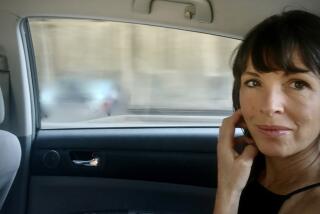FICTION
- Share via
FESTIVAL FOR THREE THOUSAND MAIDENS by Richard Wiley (Dutton: $18.95; 240 pp.) . Into the ordered society of a Korean village in the late 1960s drops a Peace Corps teacher named Bobby Comstock, as undefined as only a 23-year-old American can be. Obesity has exempted him from the Vietnam War draft, restricted him to the role of clown, disqualified him from romance. Comstock is used to feeling that he moves “through the lives of others leaving no trail,” but in Korea he lands like a big, soft bomb.
Richard Wiley (“Soldiers in Hiding,” “Fools’ Gold”) manages something rare here: He does justice to the virtues of both East and West. Some of the high points of this novel are excerpts from the diary of the 60-year-old vice headmaster of the school where Comstock teaches. Imbued with the Confucian doctrine that life can be reduced to five hierarchical relationships (to ruler, son, wife, younger brother and friend), he is appalled by Comstock’s apparent flippancy and considers him “outside of everything imaginable”--yet is willing to befriend him once he can find something in the American to respect.
As for Comstock, his American openness gets him into trouble, but it also lets him ignore hierarchies and form bonds with GIs, bar hostesses, political dissidents and the village outcast, a scabby beggar boy. As his fat melts away, a surprisingly sturdy character emerges. When Comstock is enlisted to play a “spy” in a civil-defense exercise, his links to the dissidents are tested; when his first lover, a black woman, quits the Peace Corps after the King and Robert Kennedy assassinations, he is forced to examine his own view of the world. He doesn’t quit. He learns Korean. He endures serious illness. He tries.
Human warmth, in fact, is what carries this novel along, despite an episodic plot, a somewhat dated view of Korea and an emotional climax (Comstock attends a centuries-old festival honoring girls who committed suicide during a Chinese invasion) that is detached from the rest of the action. One wishes, too, that Wiley were a more visual writer, able to let us see his Korea as well as we feel it.
More to Read
Sign up for our Book Club newsletter
Get the latest news, events and more from the Los Angeles Times Book Club, and help us get L.A. reading and talking.
You may occasionally receive promotional content from the Los Angeles Times.










